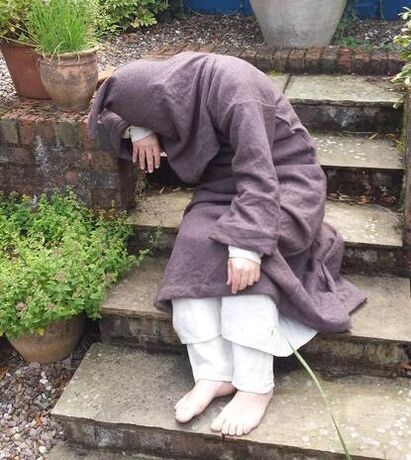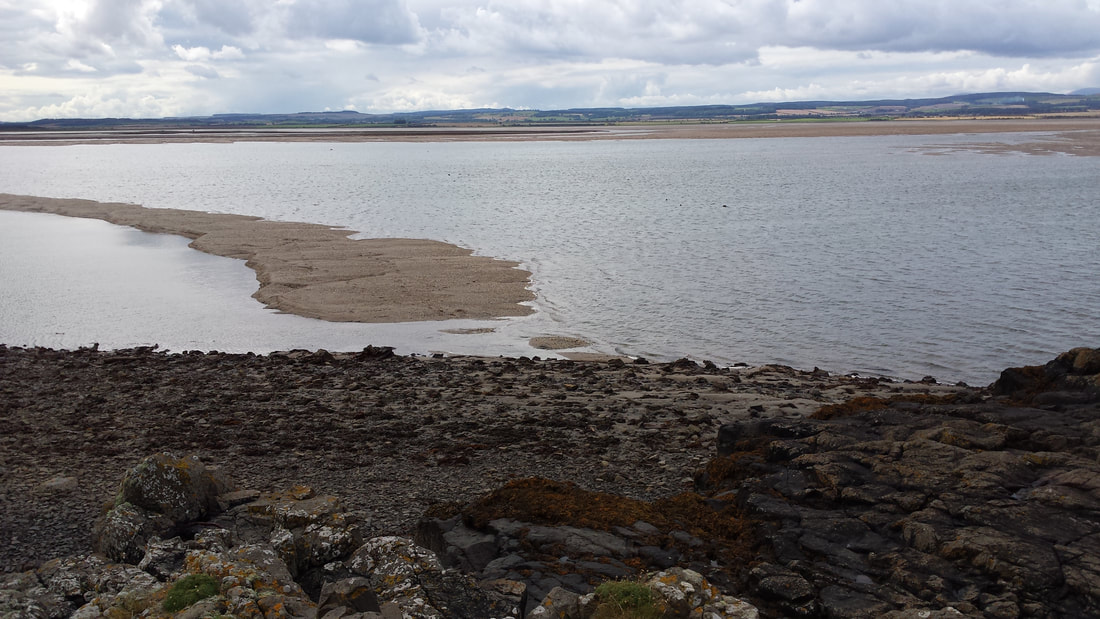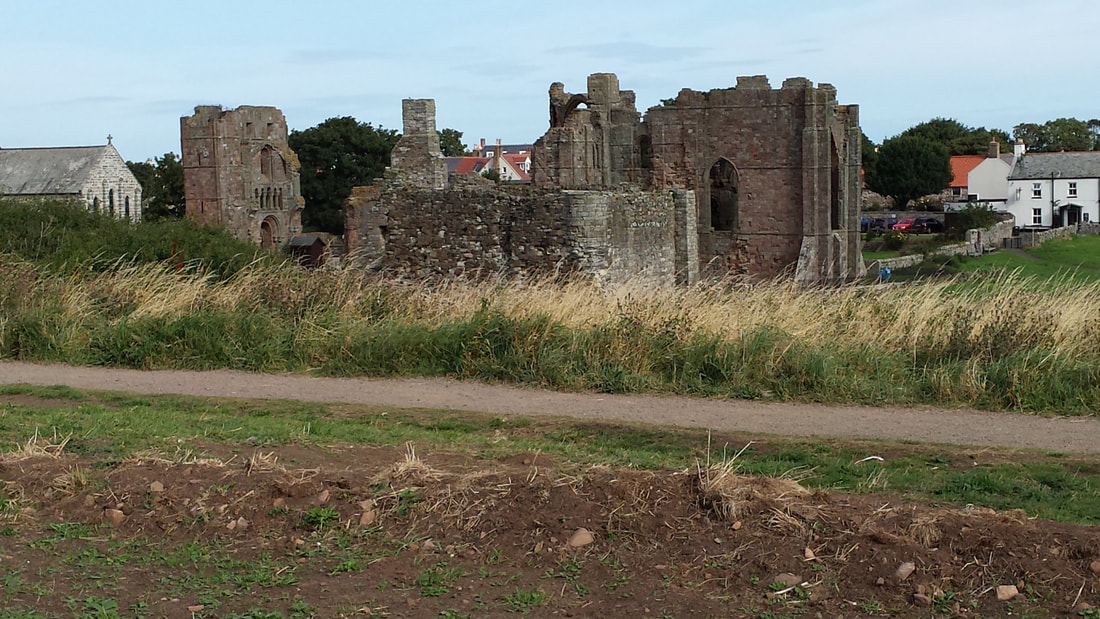|
The Anglo-Saxon Monk casts his eye over the letter written to the bishop of Lindisfarne not long after the island was attacked by Vikings. Blessed readers, That rascal, the other Monk, has been gadding about once more, alighting upon the holy ground of Lindisfarne, posturing meditatively along its monastic landscape, whilst pontificating on the raid there by the Vikings in the year 793. This is all for the first episode of the fourth series of Medieval Dead, due out in March next year. I did think of a more relevant, dare I say worthy, interviewee, but he was not asked. Anyhow, let us move forward, beloved ones. Now, I am quite convinced that, despite my best efforts, most of you probably hold at least a few warped views about life in early medieval England, not least when it comes to the matter of the Vikings. I know for a fact that most of you cannot even say the word 'Vikings' without shouting it and flailing your arms around in some unseemly violent gesture as if that somehow adds meaningful emphasis. I should perhaps, therefore, be attempting to paint a more rounded understanding of Viking culture, by taking a look at Viking architecture, for example, or Viking art, but I'm afraid I'm going to have to temporarily ignore my urges for balance and go right on and reinforce the stereotypes by looking at one of the first Viking raids ever recorded in Anglo-Saxon history. The Anglo-Saxon Chronicles tell us that in the year 793 'the raiding of heathen men miserably devastated God's church in Lindisfarne island by looting and slaughter'. It would seem that this was a 'park-and-raid' Norwegian Viking attack, a relatively swift grab of portable wealth from the monastery, with a sprinkling of murder and kidnapping. Alcuin of York, scholar of impeccable intellect and educator at the court of no less than Emperor Charlemagne, describes in a letter to Lindisfarne's bishop, Higbald, how the 'tragic sufferings' of the bishop daily brought him sorrow. The pagans have desecrated God's sanctuary, shed the blood of saints around the altar, laid waste the house of our hope and trampled the bodies of the saints like dung in the street. I can only cry from my heart before Christ's altar: "Oh Lord, spare thy people and do not give the Gentiles thine inheritance, lest the heathen say, 'Where is the God of the Christians?'" Where is He, indeed? Not that I am profaning the Lord here. Who would think such a thing? No, I'm merely echoing Alcuin's feelings, for he goes on to declare that the Viking raid of Lindisfarne, the holiest of places in Northumbria, makes us doubt that any assurance can be given to the rest of the churches in Britain. If Saint Cuthbert won't defend his own, well what hope is there for the rest of us? But clever fellow that he is, Alcuin finds the true reason for the ostensible divine abandonment of Lindisfarne to its devilish fate. What else but sin! Is this the beginning of the great suffering, or the outcome of the sins of those who live there? It has not happened by chance, but is the sign of some great guilt. And what terrible guilt is Alcuin alluding to, you ask. Well, despite the fact that in his lovely introduction he calls the 'whole community' of brethren at Lindisfarne 'good sons in Christ of a most blessed father, the holy Bishop Cuthbert', he manages nevertheless to spell out for them what it is that they have been doing so wrong. Why, they haven't been dressing properly, of course! Do not glory in the vanity of dress; that is cause for shame, not boasting, in priests and servants of God. Do not blur the words of your prayers by drunkenness. Do not go out after the indulgences of the flesh and the greed of the world, but stand firm in the service of God and the discipline of the monastic life, that the holy fathers whose sons you are may not cease to protect you. May you remain safe through their prayers, as you walk in their footsteps. Do not be degenerate sons, having such fathers. They will not cease protecting you, if they see you following their example. Well! From good to degenerate sons in less than twenty lines! Admittedly, Alcuin is pointing to a little more than just bad dress sense as the root cause of Viking mayhem in their lives. Why, the monks were apparently knocking back too much ale, too! And it seems Alcuin throws in a reference to fleshly desires and greed just to make sure he is covering all bases. Ever alert for ways of applying good counsel to my blessed readers, I will just say to you this: if you are ever wondering why the Lord and his saints are not intervening in your life, you now know the reason: it's your own fault! It is not that Alcuin in his letter is devoid of compassion, I hasten to add. No, indeed not. Note how he promises Bishop Higbald that he will have a word with Charlemagne, once he gets back from his empire building, to see if something can be done to help. When our lord King Charles returns from defeating his enemies, by God's mercy, I plan to go to him, and if I can then do anything for you about the boys who have been carried off by the pagans as prisoners or about any other of your needs, I shall make every effort to see that it is done. Those poor young lads, some maybe as young as seven, taken from their peaceful life as oblates in the monastery to be sold as slaves, no doubt. Well, at least Alcuin is looking out for them. I hope he manages to buy some of them back from those nasty Vikings. And Alcuin's compassion does not stop there, blessed ones. No. He reasons with the brethren that in all this looting and slaughter they should sense the Lord's love. I swear, blessed ones, I can hear the bishop reading it to them over dinner in what's left of their refectory. Do not be dismayed by this disaster. God chastises every son whom he accepts, so perhaps he has chastised you more because he loves you more. Who could deny such compassion? And such logic, too? All the bishop and the brethren need to do is stop wearing fancy clothes and drinking too much and view and see the trampled bodies of holy monks and kidnapped boys as the clearest proof of the Lord's love. Very resonable. Well, He obviously did love them because the monks at Lindisfarne continued to endure Viking incursions for decades after receiving Alcuin's fine letter, until they'd all had enough and moved camp (and Saint Cuthbert's body) from the island to the mainland in the year 875, and then settling at St Cuthbert's Church in Chester-Le-Street seven years later. There was more love from the Lord towards the end of the tenth century when the brethren were attacked by Danish Vikings and the good sons of Saint Cuthbert moved once more, this time to Ripon, in 995. I can't help thinking that much of this would have quite simply passed over the head and bypassed the heart of that other Monk whilst he was traipsing all over Holy Island, even had I been there to make sure he heard the full story. Well, what can I say? He's such a degenerate son. May the Lord have mercy. Works used: Alcuin of York, Letter to Higbald, trans. by Stephen Allott in his Alcuin of York (The Ebor Press, 1974) Stephan Brink, The Viking World (Routledge, 2008) Michael Swanton, trans. and ed., The Anglo-Saxon Chronicles (Phoenix Press, 2000) Video shot on Dr Monk's phone. No that man is not a Viking! © Christopher Monk 2017
8 Comments
4/9/2017 05:34:06 am
Degenerate monks, they were probably listening to Beowulf when they should have been at evensong.
Reply
4/9/2017 09:16:52 am
They were probably writing it down! No wonder God abandoned them. Shame the Vikings stole the illuminated Beowulf, though. Very sad.
Reply
14/9/2017 12:09:08 pm
I sometimes wonder if there were other epic poems in the English langauge that might have been lost at that time. What happened to the rest of Deor, for instance?
Reply
Christopher Monk (the other Monk)
4/10/2017 10:12:59 am
Sorry the holier monk has been so tardy in responding. I'm afraid I'll have to do. I'm suspect we have indeed lost a great deal of early English writing, including perhaps other epic poems. Thinking, too, of the life of scops, I would imagine they could draw upon a very large tradition of oral poetry, some of which, like Beowulf, found its way into written form but of which we sadly have no record. Btw, I've worked out your the author of a new biography of Æthelflæd. I am going to have to get that!
Reply
4/10/2017 11:12:51 am
Yes, guilty as charged on the matter of the biography. Its available at all purveyors of books, and on the Internet. 4/10/2017 11:18:55 am
I apologize for the non-working link in my name in the last comment, I somehow managed to fill in my website details incorrectly (confusing Blogger with Wordpress). Mea Culpa!
Reply
Jonathan Herold
10/6/2018 05:31:43 pm
Alcuin's letter to Higbald isn't the only one that mentions that the brothers (as well as other privileged members of King Æthelred's acquaintance) might be dressing extravagantly and consuming immoderately. A.'s letter to Æthelred even goes so far as to note that the Northumbrian upper-crust had taken to wearing their hair in the manner of pagans (as well as behaving in like them in other places than the dining hall: he notes that some of the king's pals had even been despoiling "the handmaids of God" with their goings-on!). Now, some of my text-savvy associates have noted that this passage conforms to conventional homiletic tropes; but surely tropes/analogies work best when drawn in reference to real-world situations, and Alcuin, after all, was alive and -thinking- at the time when word of this unhappy event reached him. Let's face it, Brother Monk: 8th-century Northumbria was a hot mess! Perhaps the high muckedy-mucks up the coast at Bamburgh had indeed been importing extravagant goods from abroad via those Vikings, and then offering to pay for them with the practically worthless bronze styccas that the Northumbrian kings had begun circulating around that time? Might it be possible that even Bishop Higbald might have tried such a trick? If so, is it any wonder those benighted pagans, who knew only that they had ships to maintain and families back home to feed, might ignore the sublime state of blessedness that the ornaments of the church were intended to convey, and instead have said to themselves: "Ooooh, look: shiny! I bet those would fetch good value in trade at Dorestad or Ribe." Similar thoughts, I hesitate to add, might have led them to abduct some of the youthful members of the community. I know that few of the learned nowadays read Alcuin's letters as anything more than examples of florid medieval epistolary practice, but I can't help thinking that perhaps a situation like that I have imagined above might explain why the learned Alcuin chose to exhort his king and the bishop to do a better job of living up to Christian ideals. . .
Reply
The Anglo-Saxon Monk
10/6/2018 05:46:02 pm
Blessed Jonathan, you speak with sense. To take correspondence out of its immediate context is, I would suggest, a mistake. There is no reason to believe that Alcuin was incapable of deploying literary formulae in a way that would make sense within a specific, real world happening.
Reply
Your comment will be posted after it is approved.
Leave a Reply. |
Details
|




